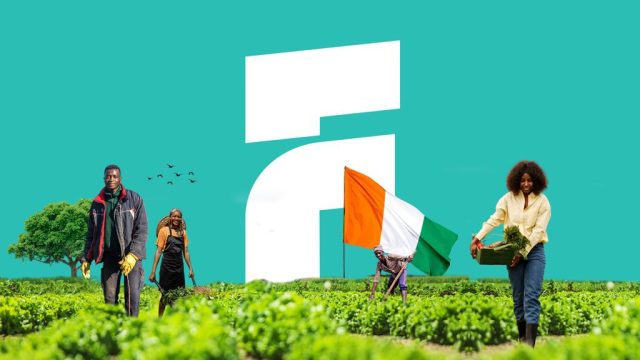Farmerline – one of the world’s leading agritech companies – has announced its expansion into francophone Africa with an official launch of operations in Cote d’Ivoire; deepening partnerships across West Africa and accelerating its commitment to support small scale farmers everywhere.
In line with Farmerline’s existing model combining local and global industry stakeholder partnerships, well-trained field agents, farm resources, logistics and award-winning digital tools, the expansion will see Ivorian farmers benefit from access to high-quality fertilizers and seeds; free education on climate-smart farming practices via a 1349 shortcode (similar to 911, but for farmers); and connections to international markets.
This year marks a decade since Farmerline was launched by co-founders Alloysius Attah and Emmanuel Owusu Addai; delivering daily voice and SMS agronomic messages to 800 farmers in Ghana’s Ashanti region in their own language through the company’s technology platform Mergdata.
Since 2013, they’ve collaborated with over 3000 strategic partners across 48 countries, including government institutions, local agribusinesses, NGOs and food companies who have licensed Mergdata to support and improve the lives of 1.7 million small-scale farmers to date.
‘We’ve worked with partners who have been using our technology in Ivory Coast for the past six years,’ Alloysius explains. ‘The time has come to expand and fully commit to helping Ivorian agribusinesses to drive forward the farmer and agribusiness digitisation agenda, including creating and distributing localised agronomic and farm services to support as many farmers in the country as possible.
‘Ivory Coast is home to over three million smallholder farmers, and Abidjan is the centre of the francophone Africa region,’ Alloysius adds. ‘We’re very excited about the opportunities we see there and partnerships will be key to realising the possibilities. We don’t see this as a winner takes all approach or a zero sum gain. We will continue collaborating with local agribusinesses, farm cooperatives, our existing partners, government and food trading companies aligned with our mission to create lasting profit for small scale farmers and promote sustainable agriculture in the country.’

Last year, Farmerline announced a Pre-Series A investment raise of $14.4 million and grew their team across the West African locality. The company’s new Regional Manager of Francophone Africa & Country Manager of Ivory Coast, Joel Amani Kouame says: ‘Our team are excited to bring our solutions to Ivory Coast and we look forward to serving the farmers in this region.
‘Agriculture remains the core of African economies, and by bringing big data management technologies and predictive analytics into farming; alongside providing quality inputs in a timely manner, agronomic support and a marketplace for smallholders, we can make the sector far more efficient. We believe our approach to agriculture can create lasting benefits for small scale farmers and help drive economic growth in the region.’
Over 100 industry stakeholders, including H.E Mme Yvette DAOUD, Ambassador of the Kingdom of the Netherlands, joined Farmerline at Sofitel Abidjan Hotel Ivoire in Abidjan on 6th April for the launch announcement, which featured presentations from their existing and forthcoming local partners including Beyond Beans, TechnoServe, Bayer and Locagri.
‘The rural sector in Cote d’ Ivoire has grown in recent years thanks – in part – to the sophistication of cooperatives and the greater role they play in farming communities,’ says Fayelle Ouane, Country Director for TechnoServe in Cote d’Ivoire.
‘We’re thrilled to partner with Farmerline to bring innovative solutions and improved opportunities to farmers in the country. With our combined expertise and innovation, we look forward to reaching close to a million farmers across different regions over the next few years.’
















